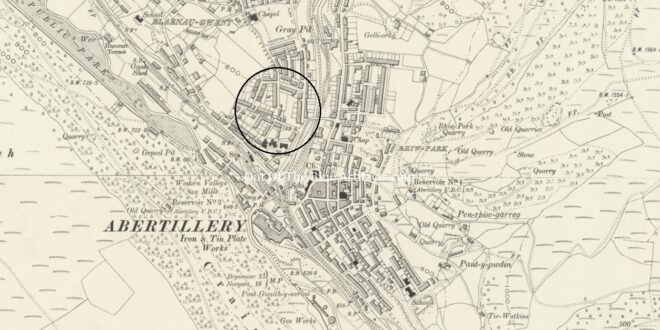Clyn Mawr Isaf.
Clyn Mawr Isaf Farm was located at the south western side of Brynteg, an area part of lower Blaenau Gwent. The farm was later surrounded by housing and demolished when the new housing on the roads of Portland Street and Gladstone Street began encroaching on the farm land. After the demolition of the farm, four houses were built on its ground, numbers 1, 3, 5 and 7 Portland Street.
Clyn Mawr was originally an area of Blaenau Gwent, from the Clyn Mawr Uchaf (upper farm) to the Clyn Mawr Hotel taking in Blaenau Gwent Rows, across to the east to the Clyn Mawr Ganol (middle farm) down though Clyn Mawr Street (Glynmawr Street) and terminating at the Clyn Mawr Isaf Farm (lower farm) at the bottom of Portland Street. The area of Clyn Mawr featured heavily in the book “An Historic Account Of Aberystruth” by Edmund Jones, written in 1779 and was referred to as Clun Mawr.
Clyn is a corruption of Clun, roughly translated to meadow, moor or a wood. Mawr is large or big. On the land maps of the 1830’s the area was also written as Clain Mawr. Glynmawr was a corruption of Clyn Mawr.
The 1840 Tithe Map.
Apart from the odd newspaper article there is a lack of early information on the occupants at Clyn Mawr Isaf Farm. There doesn’t seem to be any record of its history made available until the 1840 tithe map apportionment and the following year’s census of 1841.
Mr William Edmunds.
On the 1840 tithe map shows Messrs Joseph and Crawshay Bailey as the landowners with Mr William Edmunds as the tenant at Clyn Mawr Isaf Farm, Abertillery.
On the 1841 census Mr William Edmunds was resident at Clyn Mawr Isaf Farm, Abertillery. Mr William Edmunds was born in 1781, at Aberystruth, listed as a widower living with his children – Mrs Mary Edmunds, born in 1821, Miss Ann Edmunds, born in 1826. Master Joseph Edmunds, born in 1826. Master William Edmunds, born in 1826. Master Thomas Edmunds, born in 1829 and Master Ebenezer Edmunds, born in 1831.
On the 1851 census, Clyn Mawr Isaf – William was living at the farm with his daughter Mary Edmunds. The family had moved out.
Mr Joseph Edmunds.
On the 1861 census Mr Joseph Edmunds was resident at Clyn Mawr Isaf. Mr Joseph Edmunds, the son of William Edmunds was listed as a farmer of 18 acres. He lived at the farm with his wife Mrs Mary Edmunds nee Powell, born in 1840. Also living at the farm were his father, William Edmunds, former farmer, aged 79 and his brother Thomas Edmunds, a master tailor who was visiting at this time and William and James Hill, both nephews, aged fourteen and ten years of age.
On the 1871 census Joseph Edmunds still resided at the farm with his wife Mrs Mary Edmunds and children – Master Edmund P. Edmunds, born 1862. Miss Sarah A. Edmunds, born 1863. Master William Edmunds, born 1865. Miss Mary Edmunds, born 1866. Miss Honor Edmunds, born 1869 and Miss Abigail Edmunds, born in 1870.
On the 1881 census Mr Joseph Edmunds was listed as a tiler and plasterer and the family, as above, were listed as living close to Division Street Abertillery.
Glyn Cottage.
The Clyn Mawr Isaf Farm was not listed on the 1881 or the 1891 censuses, although on the latter census, in the there where the farm was located there was a Glyn Cottage and Barn Houses. So it is possible that Clyn Mawr Isaf had ceased being a farm and had been used as a cottage or house.
Later Years.
With the growth in population at Abertillery during the industrialisation, Clyn Mawr Isaf farm or house and the little ground that was left became engulfed by dwellings on lower Portland Street. In the early 1900’s the farm was demolished with four houses being built on its ground. These four properties were later numbered 1, 3, 5 and 7 Portland Street.
Points of Interest –
Mr Joseph Edmunds.
During the early 1850’s many of the inhabitants felt it was time to secure better educational facilities for the children. A few got together and decided to appoint a committee to go into the matter thoroughly. The Rev W. Roberts (Nefydd) of Blaina, who was occupying an official position under the British School Society, came to the assistance of the committee which was composed of the following gentlemen – Mr Joseph Edmunds of Clyn Mawr Isaf; Mr David Jones, of Ty Sammy’s Farm, Abertillery: Mr Watkin Rowland; Mr Phillip Mills, father of Rev Andrew Fuller Mills; Mr Joshua Davies; Mr Thomas Bevan; Mr William Prosser; Mr Edward Jones, Postmaster; Mr William Harris and Mr Edmund Williams, father of Rev Thomas Williams, Baptist Minister of Newtown:
This new school was to be built under the auspices of the British Society and named the British School
 Out Of The Blue Artifacts A Library of a lifetime of collecting
Out Of The Blue Artifacts A Library of a lifetime of collecting
